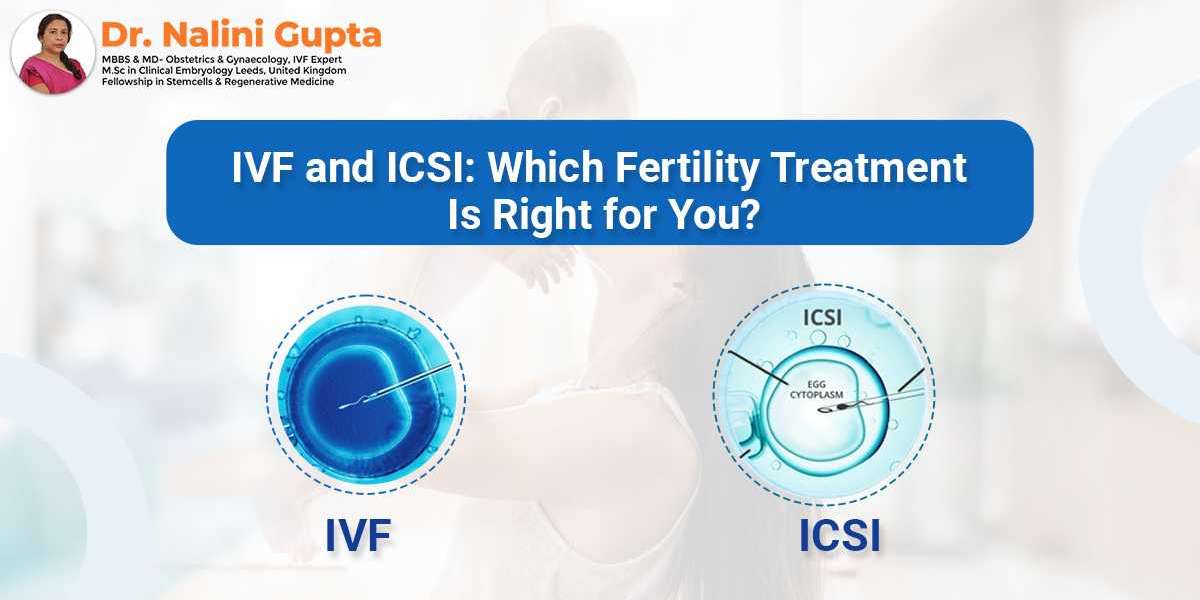Parenthood is a wonderful adventure that many Delhi couples wish to start on. However, when faced with reproductive issues, it's critical to investigate all possible possibilities. Dr. Nalini Gupta, the best IVF consultant in Delhi, is here to explain two regularly used fertility treatments: In Vitro Fertilisation (IVF) and Intracytoplasmic Sperm Injection (ICSI). Understanding the distinctions between these two treatments might assist you in making an educated decision regarding your road to parenting.
What is IVF?
In Vitro Fertilisation (IVF) is a popular and commonly used reproductive procedure. It entails stimulating a woman's ovaries to generate numerous eggs, which are then extracted and fertilized in a laboratory using sperm. Following fertilization, one or more embryos are transferred to the woman's uterus in the hopes of implanting and resulting in a healthy pregnancy.
What is ICSI?
Intracytoplasmic Sperm Injection (ICSI) is a kind of IVF. While IVF includes enabling sperm to spontaneously fertilize an egg, ICSI is a more hands-on procedure. During ICSI, a single sperm is precisely inserted directly into an egg. This approach is especially useful when male infertility problems such as low sperm count or poor sperm motility are a concern.
Key Differences Between IVF and ICSI
- Sperm Selection: During IVF, sperm is positioned near eggs to facilitate natural fertilization. ICSI, on the other hand, entails the exact selection of a single sperm, which is then directly injected into the egg. As a result, ICSI is extremely beneficial for couples coping with male infertility.
- Fertilization Rates: When male infertility issues are present, ICSI often delivers greater fertilization rates than standard IVF, making it a good alternative.
- Indications: IVF is frequently used when there are no particular male infertility difficulties and the female spouse is the source of infertility. When male reproductive issues, such as low sperm count, poor sperm motility, or aberrant sperm morphology, are found, ICSI is advised.
- Success Rates: IVF and ICSI success rates might vary based on individual conditions. Couples should visit with Dr Nalini Gupta, the leading IVF Specialist in South Delhi, to identify which therapy is most suited to their specific scenario.
- Costs: Because of the additional laboratory procedures required, ICSI is often more expensive than standard IVF. When choosing fertility therapy, couples should consider their money.
Choosing the Right Treatment
When picking between IVF and ICSI, it's important to visit the best IVF doctor in Delhi, Dr. Nalini Gupta, to examine your reproductive concerns. The treatment recommendation will be influenced by factors such as the reason for infertility, sperm quality, and the woman's overall reproductive health.
ICSI can increase the chances of successful fertilisation for couples struggling with male infertility. However, it is critical to remember that the end objective is a safe pregnancy and a happy family. The decision should be based on what is best for you and your spouse, taking into account your specific circumstances and preferences.
Conclusion
As you begin your road to parenting, it's critical to grasp the distinctions between IVF and ICSI. Dr. Nalini Gupta from Delfinium Fertility and IVF Treatment, the best IVF treatment in Delhi, can help you make an informed decision about which fertility therapy is appropriate for your requirements and objectives. Remember that no matter which road you take, the ultimate aim is to have a beautiful and healthy kid, and both IVF and ICSI can help you achieve that goal.
Read Also...
Best Fertility Clinic in Delhi
Best Infertility Centre in Delhi
Best Infertility Clinic in Delhi
Best Gynaecologist in Delhi
Best Gynecologist in Delhi








